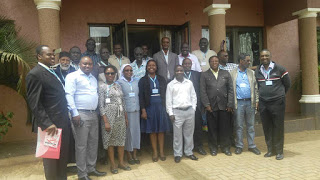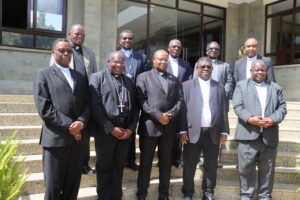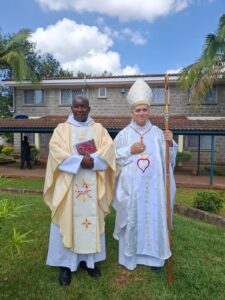UGANDA: Social Ministry Commissions in AMECEA Region to Integrate for better Services Delivery

Group Photo of the Heads of Social Ministry Commission of the Catholic Church in AMECEA Region during their Annual Meeting held in Kampala Uganda
The Heads of Social Ministry Commissions of the Catholic Church within the AMECEA Region have agreed to work towards integrating catholic church social initiatives in order to build on their strengths to achieve more for the people they serve. The decision was made during the first ever annual meeting of representatives of Justice and Peace, Caritas and Health Departments from the nine AMECEA Countries.

of the Catholic Church in AMECEA Region during
their Annual Meeting held in Kampala Uganda
The meeting which was organized by AMECEA Justice Peace and Caritas Department and held in Kampala Uganda between 24th and 25th April, 2007 was in cognisant of the newly established Dicastery for the Service of Integral Human Development which was recently inaugurated at the Vatican.
According to a communique sent to AMECEA Online News by the coordinator of AMECEA Justice Peace and Caritas Department Mr. Antony Mbandi, there is need for total re-alignment of the Catholic Church Social Commissions in line with the new Dicastery of Promoting Integral Human Development as this will strengthen all the agents working in the commissions from across the region, to enhance their understanding of the needs of the human person and all persons while seeking true development.
“Realizing the importance of accountability in our work to all stakeholders, especially to all faithful and the poor, we undertake to enhance institutional strengthening by adopting Catholic Management standards to enable us develop policies that will safeguard our resources. We will do this by promoting healthy dialogue between national offices and diocesan structures in all conferences especially in the social commissions,” the communique said.
During the meeting which focused on sharing of experiences as well as deliberations on what could collectively be done to empower people to end poverty, improve health, build peace, promote good governance and rule of law within the AMECEA Region and the entire African continent, a number of cross-cutting issues of concern emerged which includes the slow progress towards effective collaboration within the existing structures at regional, national and diocesan level which impacts on the ability to reach out to all people optimally looking at the over 320 million people within the AMECEA region.
Other issues of concern included the negative impact of human activity on the environment; the growing tendency by governments to cripple Civil Society work in the region in the name of regulation; the continued instability and violence in South Sudan; the lack of political goodwill and continued reluctance by governments across the region to admit hunger situations whenever there is drought; increased cases of unregulated use of fire-arms in some communities within the AMECEA region and lack of sustainability mechanisms of social ministry of the church within the AMECEA region.
As a response to aforementioned concerns, the commissions have undertaken to work with the church leadership at all levels to ensure proper understanding and adoption of management standards and they are calling upon governments and social ministries in the AMECEA region to put in place transformational mechanisms of peace and love towards cultural, socio-economic and political marginalization to effectively disarm the mind of communities in gun infested areas and overcome cases of illicit arms trade.
∽End∽
By Pamela Adinda


